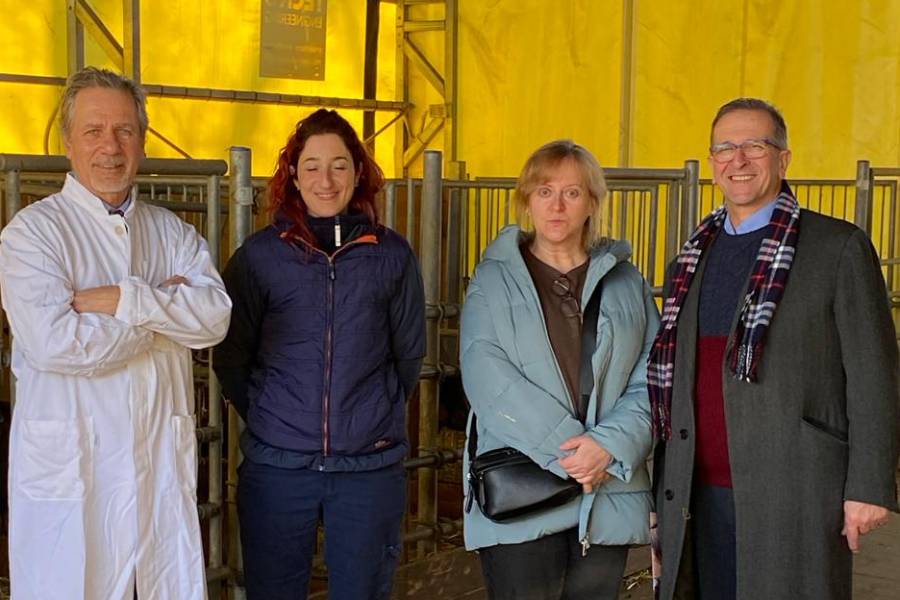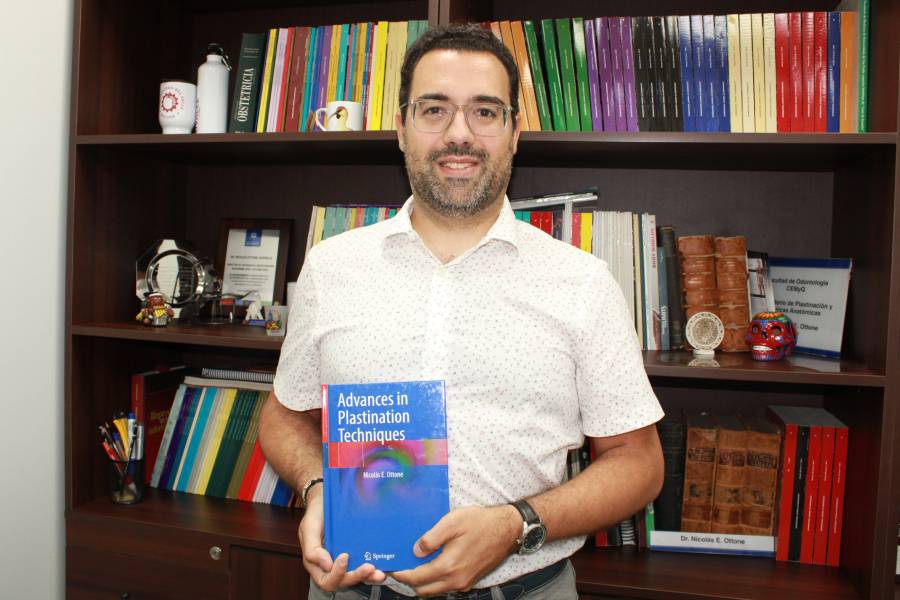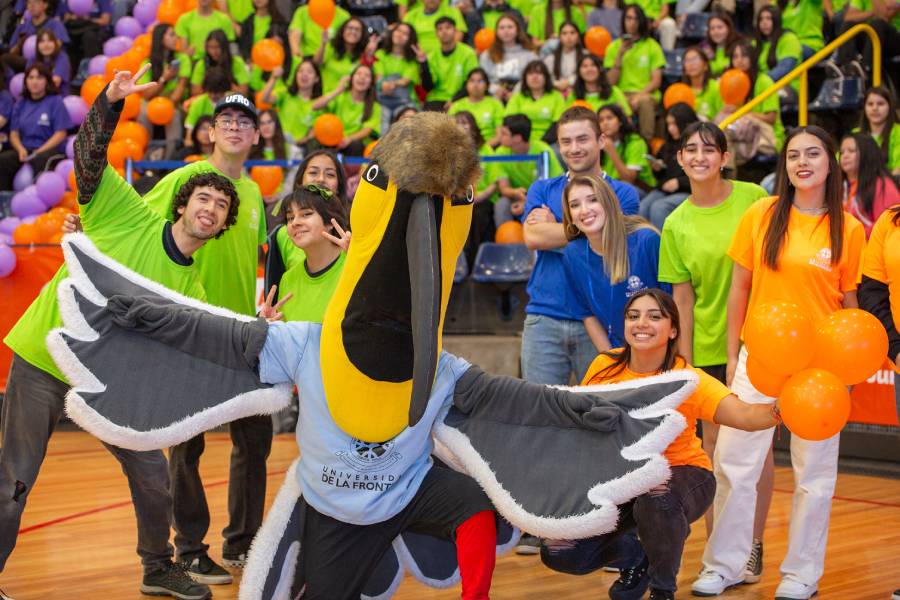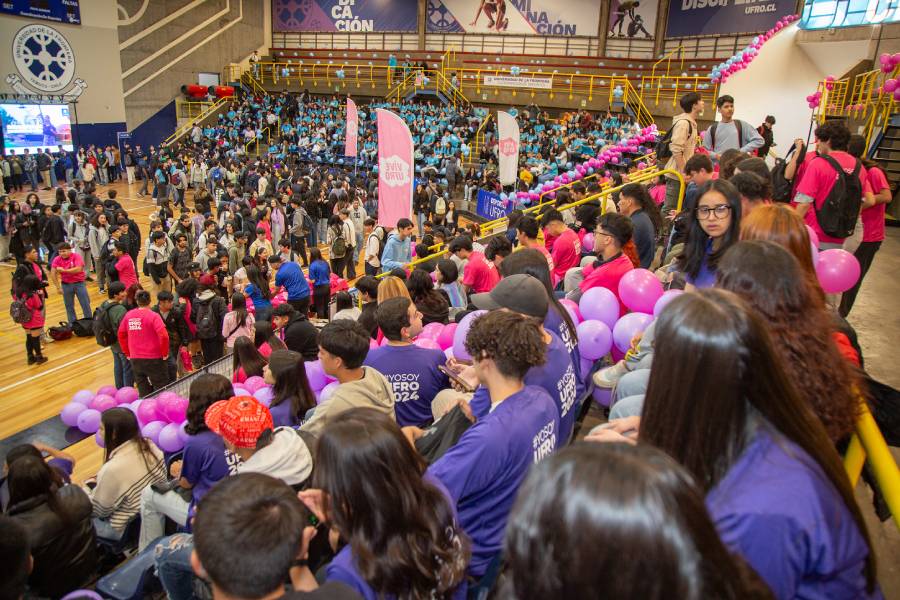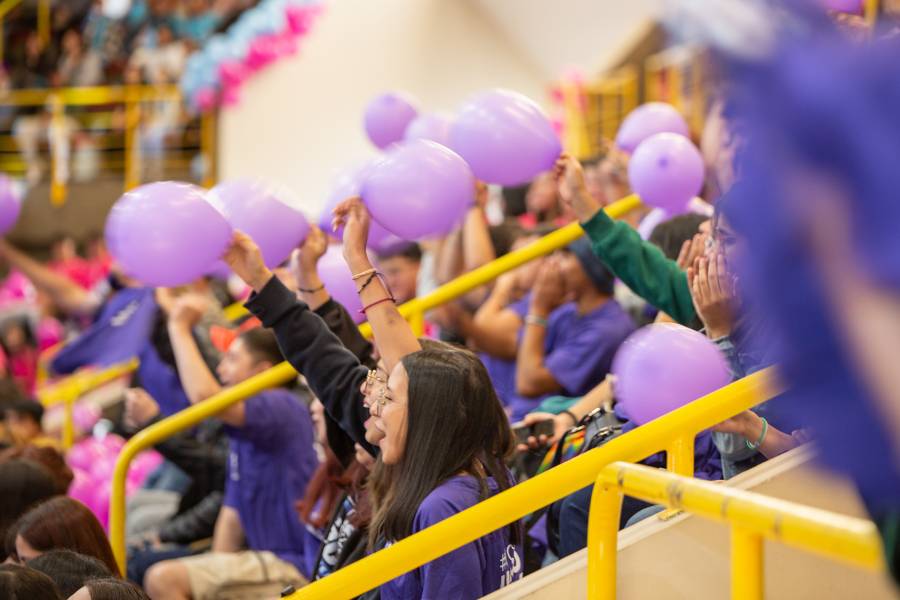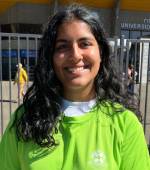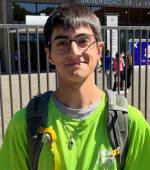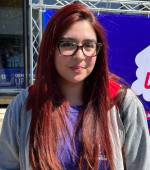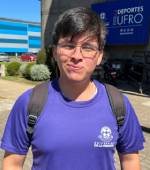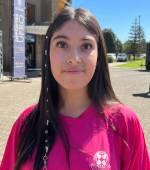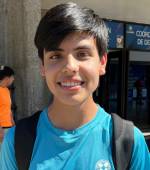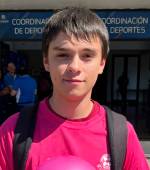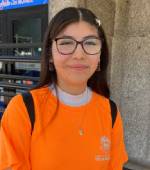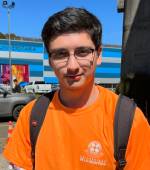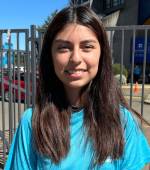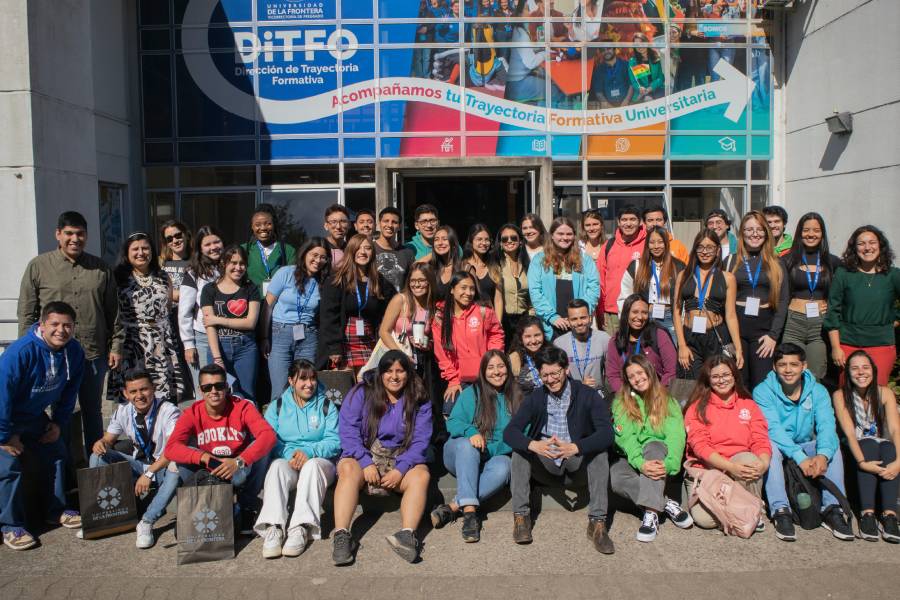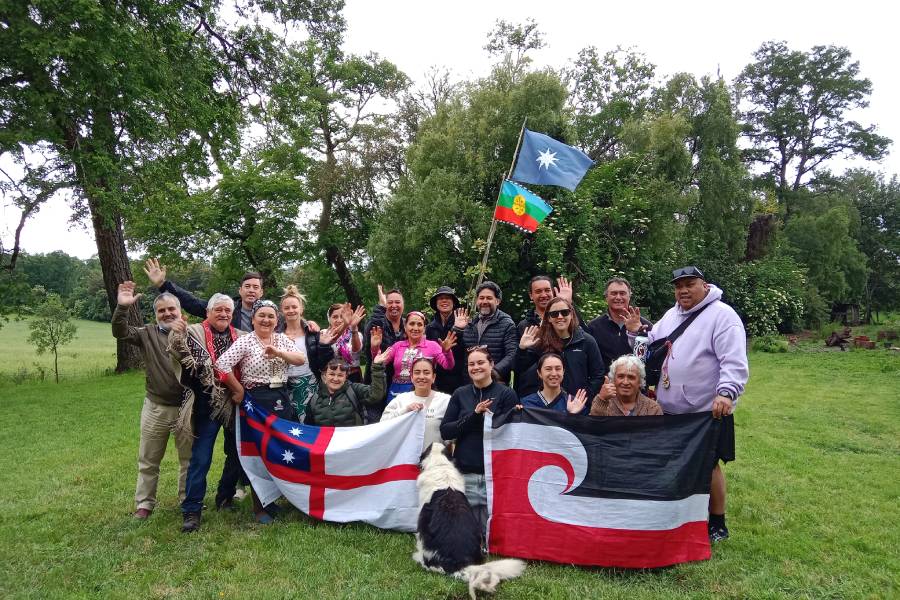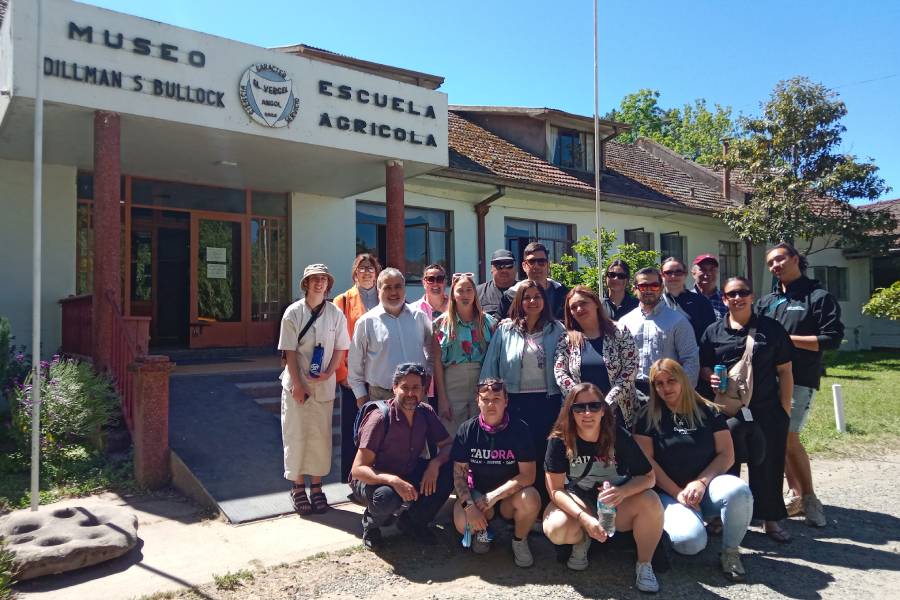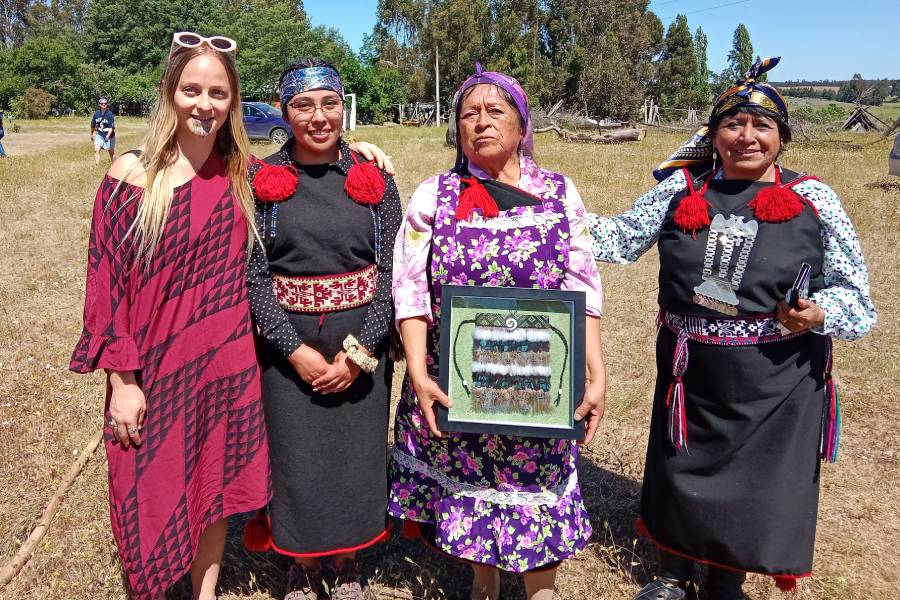|
The delegation of academics of Universidad de La Frontera visited the University of Bologna and the University of Padua, located in the Veneto region in northern Italy, to strengthen their partnerships and talk about the existing and future international cooperation agreements. |
A delegation of Universidad de La Frontera (UFRO) visited the University of Bologna and the University of Padua in Italy, to strengthen the international cooperation networks through the Master’s Programme in Agri-food Innovation and Management. “We wanted to consolidate our cooperation with the University of Bologna and made the arrangements to send a second-year student of the Master’s Programme there in September, for three months. That is very good news,” said Dr. Claudia Barchiesi, the director of the Master’s Programme in Agri-food Innovation and Management of UFRO. In addition, she explained that she was very satisfied and enthusiastic about this new opportunity for the students to broaden their horizons and to see what is happening in the world. “It is important for them to see what is happening in other so-called first world countries, which have similar problems as we do in Chile or the Araucanía Region. That way, we are not falling behind in terms of research or the way we approach different issues and can look forward to the positive effects of this cooperation,” she explained. CONSOLIDATION Within the work towards the internationalisation of the Master’s Programme in Agri-food Innovation and Management, the delegation of Universidad de La Frontera also visited the University of Padua in northern Italy, to strengthen the partnership and talk about the possibility of an international cooperation agreement. “We have already been working together for several years, but without a formal agreement. We are currently working on the bases for this cooperation, with the intention of sending another student of our Master’s Programme in Agri-food Innovation and Management to Italy next year, for an internship,” Dr. Claudia Barchiesi said. “Our idea is that also other graduate programmes of our university can make use of this partnership and the opportunities it provides, since there is growing interest in the work developed at Universidad de La Frontera on environmental and forestry topics, in terms of recovery and restoration. There is no doubt that it opens a lot of doors when we strengthen our international networks,” she added. Written by: Yasna Barría, Faculty of Agricultural Sciences and Environment |
|
This is the first-ever book on plastination techniques only, published by a publishing house. |
The outstanding professor and researcher Dr. Nicolás Ottone of the Faculty of Dentistry of Universidad de La Frontera (UFRO) made a significant contribution to the field of morphological sciences, by publishing the book “Advances in Plastination Techniques” through the prestigious Springer publishing house. Dr. Ottone is a medical doctor who has a PhD in Morphological Sciences and is the director of the Laboratory of Plastination and Anatomical Techniques of the Faculty of Dentistry and the Centre of Excellence on Morphological and Surgical Studies (CEMyQ) of Universidad de La Frontera. With great satisfaction and joy, after 17 years dedicated to this field, he was now able to publish his first book, which deals in its different chapters with topics such as the origins of anatomical techniques and plastination, the fundamentals on plastination and its different techniques, as well as aspects of biosafety and ethical considerations. This important contribution is the first-ever book on this issue. “There are no books published on plastination techniques. It is the first one worldwide. There are books on anatomical techniques, but they are published by scientific societies or individual authors and not by publishing houses, so this is the first book in the field of plastination,” Dr. Ottone explained. PLASTINATION TECHNIQUES According to Dr. Ottone, plastination allows the safe conservation of morphological and anatomical structures of human bodies, animals or other biological samples, being considered one of the most innovative techniques for the conservation of complete bodies, sections and organs, for use in teaching, research and outreach. The techniques can be used on large bodies, such as whales, elephants and complete human bodies, as well as on embryos, or small sections or organs, obtaining ultra-thin slices, thus covering from macro to micro-anatomical structures. “This book includes the explanation of each plastination technique, step by step, as well as their applications in anatomical teaching and research. In addition, some chapters describe the history of plastination and the origin of anatomical conservation techniques in general. Plastination is the most innovative technique for human and animal body conservation, but we also have other classic conservation techniques that have developed over time. Since the beginning, medical research was associated with the study of the human body, and the aim has always been to preserve it as long as possible, for being able to study it,” Dr. Ottone explained. “This technique also ensures that the specimen can be used for a long time. Currently, educational establishments have limited access to real human and animal bodies for anatomy and morphological sciences teaching, among others because of the rapid deterioration of bodies due to use and time. In this regard, plastination makes it possible to preserve morphological, anatomical, human and animal structures in a biosecure way and for an indefinite time, for teaching, research and outreach purposes. In addition, we also ensure the study of microanatomical and difficult to access structures,” he added. In his book, Dr. Nicolas Ottone also refers to the existing publications on plastination worldwide, to show what other researchers achieved. “That way,” he indicates, “we can see the advances or work carried out at other institutions and at Universidad de La Frontera”. Written by: Soledad Millapan Sandoval, Faculty of Dentistry |
Universidad de La Frontera receives more than two thousand new students with entertaining activities
|
Last week, UFRO carried out its traditional welcome week for the new students, with entertaining activities that helped them to get to know each other, the university and different aspects of university life. |
Last week, the university authorities, programme directors and older students of Universidad de La Frontera (UFRO) welcomed more than two thousand new first-year students at its Olympic Stadium, with different entertaining and informative activities to get to know each other, the university and different aspects of university life. The rector, Dr. Eduardo Hebel Weiss, invited the students to enjoy their university life and to be proud of being part of this regional state university, which is among the “universities of excellence in Chile”, with an accreditation of six years. “You are now part of a university of accredited excellence and quality, and we are very proud that you have chosen our university for your professional training. You are facing a great challenge in this new stage of your life, in which you are going to find a different world, with endless opportunities, within a unique and unforgettable experience,” said Dr. Hebel. Dr. Sergio Salgado Salgado, the director of the Student Development Office, pointed out that the university’s approach is to provide experiences beyond the academic aspects. “Our focus is to support our students and to provide a comprehensive professional training. That does not only include academic support but also the development of other disciplinary and personal skills during their university experience and their professional training, for a comprehensive development as a person.” Juan Méndez Vera, the director of the Office of Comprehensive Professional Training, explained: “This traditional welcome week for the students, who are starting to study in one of our programmes at the six faculties and Pucon Campus, also includes meetings between the students and their programme directors, as well as workshops, artistic events and inductions, for a successful start”. THE STUDENTS:
Written and translated by: UFRO Communications Office
|
|
A wide range of activities awaited the national and international mobility students during the orientation week, organised by the International Affairs Office to familiarise the students with the university and the city of Temuco. |
At the welcome ceremony, the International Affairs Office of Universidad de La Frontera (UFRO) welcomed the 25 national and international mobility students, who will spend the first semester of 2024 at the Faculties of Law and Business (four mobility students); Education, Social Sciences and Humanities (nine mobility students); Engineering and Sciences (five mobility students); and Medicine (seven mobility students). Antonia Espinoza of the Student Mobility Office explained: “Our welcome programme for national and international mobility students includes this orientation week, which aims at helping the students to get to know our campuses, services, administrative processes, and extracurricular activities, as well as to receive academic advice. In addition, it helps them to adapt to this new environment, also thanks to our Buddy Programme, with UFRO students, who orient and help them with their adaptation, so they are well-prepared to face the challenges they might have to confront during their stay”. In this regard, the students from Brazil, Chile, Colombia, Spain, Mexico and the Netherlands started their journey by getting to know the enrolment process and details for subject registration for their semester at UFRO. The orientation week also included a presentation by the Student Development Office, about issues related to student health and support. The Training Development Office also presented the elective subjects the students can choose from, as well as the language course offer, which includes Spanish and English, among others. DISCOVERING THE NEW ENVIRONMENT During the week, the mobility students also had the opportunity to get familiarised with the Andrés Bello Campus, on a tour, where they got to know the Central Library, the 24-hour Study Hall, the canteens and cafeterias, as well as other important places on the campus. Another highlight of the week was a guided tour around the city of Temuco, where they visited the most emblematic places, such as the National Railway Museum and the Urban Park “Isla Cautin”. During the workshop “Living Abroad”, the students were able to acquire important knowledge and tools for their time in Chile, and on the last day of the orientation week, they enjoyed the welcome activities organised by the Buddy Programme of UFRO, to be fully prepared for their start at UFRO.
Written and translated by: UFRO Communications Office
|
|
During their stay, the young students actively participated in different activities, from traditional ceremonies to intercultural seminars, strengthening the connection between the university and the community. |
The director of the Angol Campus of Universidad de La Frontera (UFRO), Sergio Bravo Pino, described the visit of the 12 Māori students from Te Wānanga o Aotearoa and Victoria University of Wellington, New Zealand, as a significant and successful milestone. The purpose of the visit was to exchange experiences between the young Māori students and the local Mapuche communities and to discuss their history, culture and aspirations. Ariana Sheehan (in charge of Student and Weaver Promotion) and Dr. Mike Ross, the director of the School of Māori Studies, accompanied the group, which was received at UFRO Angol Campus by the director Sergio Bravo Pino, where they participated as guests in activities developed by the Office of Libraries and Information Resources and UFRO Angol Campus. “This meeting shows the importance of sharing and learning from our ancestral cultures, promoting diversity and mutual understanding, which are important outreach aspects,” Sergio Bravo explained. The visit was organised by Guillermo Williamson, the director of the Department of Education of the Faculty of Education, Social Science and Humanities. He explained that the delegation received a scholarship from New Zealand’s Prime Minister to come to our region and build a partnership between both countries, Chile and New Zealand, to establish future collaborations with universities, academics, students and indigenous peoples. CULTURAL, HISTORICAL AND HERITAGE EXCHANGE After the activities on the campus, the delegation visited the Dillman S. Bullock Historical Museum, located on the premises of the agricultural high school El Vergel, where they were able to discover ethnographic and archaeological pieces from pre-Columbian Chile and the Mapuche culture, as well as embalmed species of Chile’s endemic fauna. The delegation also visited the Juana Nahuelpi viuda de Huaiquín Community, located in the Los Sauces Commune, where the local community welcomed the students with typical ancestral games, such as the “Palín”, and other typical cultural activities. Afterwards, the students stayed at the Inarrumen Event Centre and Tourist Route, managed by the Mapuche Women’s Cooperative Nahuelbuta – Traiguén, in the Contreras Indigenous Community, located in the Nagche Territory in the commune of Traiguén. They also had a Nütram (conversation) with José Contreras, the Werkén of the community, about the Mapuche society and culture, and the ancestral and historical development, and talked to the women of the cooperative about their sustainable tourism venture. In addition, the delegation visited other places of cultural importance, such as the Renvi (cave), which served as a refuge for the Mapuche people during the occupation of the Araucania – activities that the young students of the Māori delegation highly valued and appreciated. “Our university is proud to be a space of intercultural exchange and we want to thank our Māori visitors for their active participation in this enriching exchange that goes beyond the academia, deeply immersing themselves in the local reality,” said the director of UFROs Angol Campus. “During their stay, the students actively participated in different activities, from traditional ceremonies to intercultural seminars, strengthening the connection between the university, the community and the surrounding nature. In addition to sharing traditions, one of the emphases was the importance of facing and overcoming common problems that have affected both cultures,” concluded Sergio Bravo Pino.
Written by: Pedro Andrade Araneda, UFRO Angol Campus
Translated by: UFRO Communications Office |





